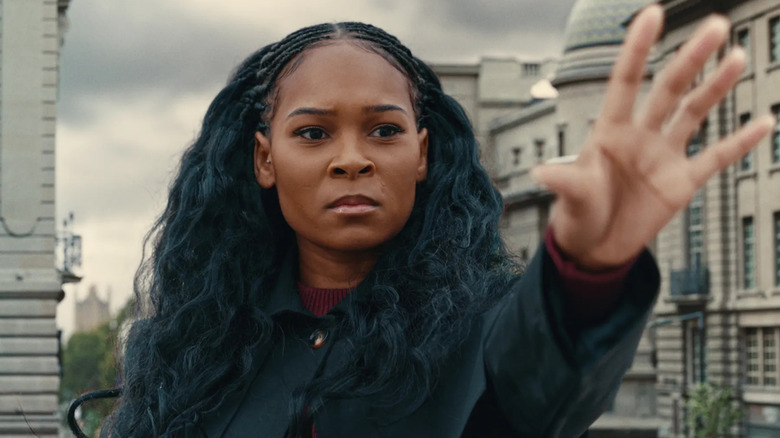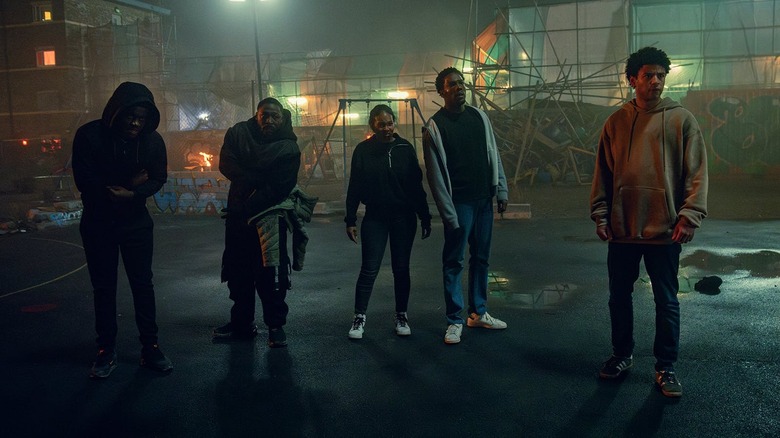A U.K. Superhero Series Is Making Its Mark On Netflix's Top Charts
The reports of the superhero genre's death have been greatly exaggerated. Make no mistake, the Marvel Cinematic Universe almost certainly won't be returning to the levels of popularity it reached with the Infinity Saga (that much was unavoidable, even if Disney and Marvel Studios hadn't fumbled the ball after "Avengers: Endgame"), and who knows what will come out of James Gunn and Peter Safran's DC Universe reboot. Still, it's silly to act like superhero culture is dead and waiting to be buried, not least of all when "Deadpool & Wolverine" is tracking for a huge box office opening near the end of this month.
Hell, we're half-way into 2024 and we're still talking about the Snyder Cut, for goodness' sake.
Superhero media loosening its grip on the public's consciousness should also be cause for celebration among those who appreciate these types of stories. Anytime a genre or brand is suffering commercially, it's an opportunity for innovation. New voices, especially those who've been excluded from the conversation in the past, suddenly have an opening to come in and experiment in ways that wouldn't be allowed if any particular type of art was still in high demand. Popularity doesn't lead to greater invention, it stifles creativity and makes studios more risk-averse than ever.
So it is that Netflix now finds itself in possession of a hit superhero sci-fi show titled "Supacell." The original six-episode U.K. series began streaming on June 27, 2024, yet has quickly found its way into the top three on Netflix most of the world over. That it's being heralded by critics as a breath of fresh air for its genre is a reminder that there's still plenty of untapped artistic terrain to mine when it comes to tales of people wielding extraordinary abilities.
Netflix subscribers around the world are watching Supacell
"Supacell" hales from rapper/filmmaker Andrew Onwubolu, aka Rapman. The multi-talented British artist made waves in 2019 with his YouTube series turned feature directing debut "Blue Story," a crime drama that employed unique theatrical flourishes to tell a story about working-class Black teenagers coming of age against the backdrop of gang violence in Deptford and Peckham. "Supacell" carries over many of the same elements as it follows a disparate group of Black South Londoners — whose ranks include financially-strapped parents, struggling nurses, hardened gang leaders, and youthful drug dealers — as they find themselves in the crosshairs of a sinister organization thanks to their newfound powers.
While only a handful of critics have weighed in on "Supacell" for the moment, those who have came away impressed, as evidenced by its 100% score and 7.5 out of 10 average rating from eight reviews on Rotten Tomatoes. According to FlixPatrol, which tracks streaming viewership across the globe, the show found its way to the number one or two spot in most countries with Netflix by July 1 and is still holding steady as of this writing. The situation brings to mind what happened with "Baby Reindeer" earlier this year, as Scotsman Richard Gadd's auto-biographical series was another case of a humble non-American show becoming a surprise international hit on Netflix thanks to buzz around its radical, personal storytelling.
Indeed, much like "Blue Story," critics are heaping praise on "Supacell" for bringing verisimilitude and a real vision to its tried-and-true tropes. "It's genuinely homegrown, a tribute to creator and writer Rapman's roots and life experience, and that pays off in practically every shot," writes Alex Godfrey, reviewing the show for Empire Magazine. If this is what the future of superheroes looks like, consider my interest piqued.
"Supacell" is now streaming on Netflix.

